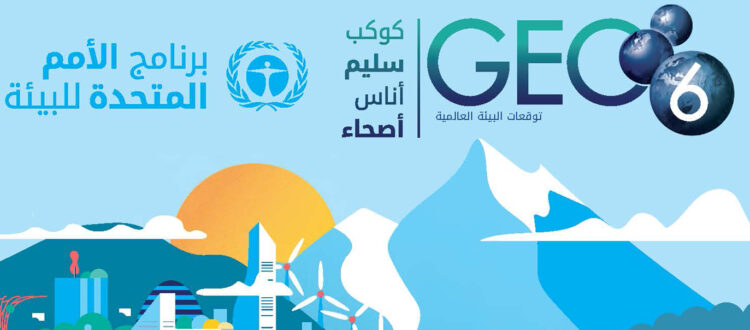Translation of the Arabic Version of GEO-6
This agreement will allow for the production of the Arabic version of the global GEO-6 assessment as well as outreach and dissemination of the GEO-6 findings across the Arabic-speaking countries of the African and West Asian regions. The Review Editors oversee the review process of designated sections of the GEO-6 report. They are responsible for ensuring that all substantive review comments are considered appropriate by the Writing Teams. They prepare written summaries of the most significant issues raised by reviewers. They may also be asked by the Secretariat to monitor and review the use and consideration of grey literature, including the integration of local and indigenous knowledge sources. They should be available to respond to the SAP’s queries about the review process and prepare final reports for the GEO Secretariat.
Partners
United Nations Environment Programme (UNEP), League of Arab States (LAS)
Region / Country
Arab Region
Objectives
- Translation, with quality control, of the main GEO-6 global assessment (approx. 500,000 words) into Arabic.
- Expert editorial and technical review of the Arabic translation.
- Professional design and layout of the Arabic version of the main GEO report.
Timeline
From – To 2021 – 2022
Outcomes
- Presenting the GEO-6 findings in several national and regional forums.
- Arabic language GEO-6 main report.
- Organizing the official launch of the GEO-6 report in the Arab region, at the headquarters of the League of Arab States, Cairo, Egypt, 21 July 2022
Publications/website/portal
برنامج الأمم المتحدة للبيئة. توقعات البيئة العالمية – التقرير السادس: كوكب سليم، أناس أصحاء. 9781108627146DOI 10.1017/. برنامج الأمم المتحدة للبيئة، نيروبي (2019).
https://www.unep.org/resources/assessment/global-environment-outlook-6-other-language-versions
Third Order Draft, Review Editors Report October, 2018
Relevance to SDGs
This project supports the achievement of SDG 9 (Industry, Innovation and Infrastructure), SDG 13 (Climate Action), SDG 14 (Life Below Water), and SDG 15 (Life on Land) by improving assessment and monitoring of the environment. The improved environmental monitoring and knowledge sharing contributes to sustainable infrastructure, climate action, marine and terrestrial ecosystem conservation, and halting biodiversity loss. It would also support SDG 4 (Quality Education) and SDG 17 (Partnerships for the Goals) by disseminating key environmental findings to diverse global audiences. Widening access to environmental knowledge across languages assists education and capacity building. Partnerships strengthen implementation and global cooperation on sustainability.
The READ platform supports the achievement of the Sustainable Development Goals (SDGs) by enhancing the quality, transparency, and efficiency of environmental assessments such as the GEO report. These assessments are crucial for informed decision-making towards achieving various SDGs. In particular, the insights derived from the GEO report, facilitated by the READ platform, directly support SDG 13 (Climate Action), SDG 14 (Life Below Water), and SDG 15 (Life on Land), and indirectly support all 17 SDGs by providing comprehensive and reliable environmental data and assessments.

